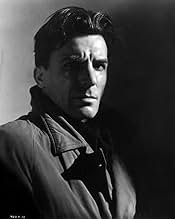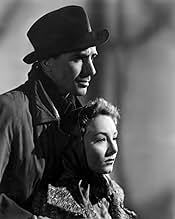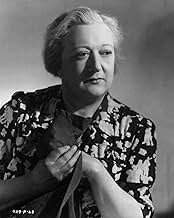Ajouter une intrigue dans votre langueA train disaster is told as four short stories to give character studies of the people involved, how it will affect them, and how they deal with it.A train disaster is told as four short stories to give character studies of the people involved, how it will affect them, and how they deal with it.A train disaster is told as four short stories to give character studies of the people involved, how it will affect them, and how they deal with it.
Patric Doonan
- Ron Stacey (segment "The Engine Driver")
- (as Patrick Doonan/Patric Doonan)
Avis en vedette
10clanciai
This is so much better than all the mass of train thrilers, all excellent and outstanding in suspense, while this one is no thriller but all perfectly natural, telling the stories of very ordinary people om board a train heading for disaster. The character you will remember best and forever is probably Peter Finch in his first film role as a Shakespeare actor in a truly tragic part, having lost his life and soul in six years of war and being constantly betrayed by his wife. His story is a drama in itself, while the other three destinies that are being followed are easier to digest, the story of the train driver, the story of a conceited conductor, his piano soloist and his wife, and the story of a German refugee, still suffering from the traumas of his past. Above all, the story is ingeniously conceived, weaving together four very different destinies, totally different from each other, none knowing anything about the others, and there are som police investigators as well, headed by Michael Hordern. There are so many dimensions to this film, the concert hall, the Shakespeare theatre, the domestic circumstances of the train driver and his family and friends, and the desperate circumstances of the refugee and his self-sacrficing girl getting their hardship exacerbated by a ruthless callous landlady. It's a pearl of cinematic invention, and the music adds to genuine quality as well. This is a film to enjoy and admire - and to have your compassion boosted with.
'Train of Events' was a critical and commercial failure in its time but if you like these British films as much as I do I think you'll find plenty to enjoy here.
'Compendium' films were popular in the late Forties, several were made from the short stories of Somerset Maugham and then there was the greatest of them all 'Dead of Night'. 'Train of Events ', hardly in that class, contains four stories which all culminate on a train which we saw crashing in the opening scenes. So, like 'Friday the Thirteenth' ( a great portmanteau movie made in 1933) the climax is a matter of virtue rewarded and villainy punished as not everyone survives.
Interestingly television is quite strongly featured for the time (1949), a wind-up gramophone looks much more appropriate!
Valerie Hobson is first actor credited though her role is no larger than several others, she plays the forgiving wife of a philandering husband. In real life Hobson was married to British cabinet minister John Profumo whose relationship with Christine Keeler brought down a government in the sixties. Once again Life Imitates Art. In another story Peter Finch murders his faithless wife. He spouts chunks of Shakespeare, looked gaunt and middle-aged to me.
The model-work at the climax is satisfyingly convincing, I recommend 'Train of Events'
'Compendium' films were popular in the late Forties, several were made from the short stories of Somerset Maugham and then there was the greatest of them all 'Dead of Night'. 'Train of Events ', hardly in that class, contains four stories which all culminate on a train which we saw crashing in the opening scenes. So, like 'Friday the Thirteenth' ( a great portmanteau movie made in 1933) the climax is a matter of virtue rewarded and villainy punished as not everyone survives.
Interestingly television is quite strongly featured for the time (1949), a wind-up gramophone looks much more appropriate!
Valerie Hobson is first actor credited though her role is no larger than several others, she plays the forgiving wife of a philandering husband. In real life Hobson was married to British cabinet minister John Profumo whose relationship with Christine Keeler brought down a government in the sixties. Once again Life Imitates Art. In another story Peter Finch murders his faithless wife. He spouts chunks of Shakespeare, looked gaunt and middle-aged to me.
The model-work at the climax is satisfyingly convincing, I recommend 'Train of Events'
The film starts with a train crash and then spends its bulk describing 4 separate situations that leads to various characters being on board the doomed train. We then return to the crash and see its aftermath.
Sounds better than it is. The film starts impressively with the force and speed of the train filmed very dramatically. This is far and away the best part of the film and provides a very powerful opening. As we meet the characters, the film gets boring and sadly, that awful unfunny British humour rears its ugly head in a couple of scenes. Trying to endear the audience to old guys by getting them to imitate a chicken or a goldfish just isn't funny to me.
Aside from the naff comedy, the cast aren't very good. This is because either the characters are weak, such as Joan Dowling (Ella), to the point where we don't care about her fate, or else they are just difficult to like. A case in point is pretty much everyone else apart from Valerie Hobson (Stella).
Pianist Irina Baronova (Irina) and composer John Clements (Raymond) are painfully embarrassing and it's all a bit of an anti-climax when so many of this dull ensemble actually survive what looks like a crash that should have resulted in many more fatalities. Oh well, better luck next time! The film scores for the excellent beginning and a confrontational scene between husband and wife Peter Finch (Philip) and Mary Morris (Louise). If the film had concentrated on developing this story in a dramatic fashion, I would be talking about a much better film. But even this little vignette is ruined by absurdity as demonstrated by what Peter Finch decides to pack in his luggage. In his LUGGAGE! To take with him! Dumb film.
Sounds better than it is. The film starts impressively with the force and speed of the train filmed very dramatically. This is far and away the best part of the film and provides a very powerful opening. As we meet the characters, the film gets boring and sadly, that awful unfunny British humour rears its ugly head in a couple of scenes. Trying to endear the audience to old guys by getting them to imitate a chicken or a goldfish just isn't funny to me.
Aside from the naff comedy, the cast aren't very good. This is because either the characters are weak, such as Joan Dowling (Ella), to the point where we don't care about her fate, or else they are just difficult to like. A case in point is pretty much everyone else apart from Valerie Hobson (Stella).
Pianist Irina Baronova (Irina) and composer John Clements (Raymond) are painfully embarrassing and it's all a bit of an anti-climax when so many of this dull ensemble actually survive what looks like a crash that should have resulted in many more fatalities. Oh well, better luck next time! The film scores for the excellent beginning and a confrontational scene between husband and wife Peter Finch (Philip) and Mary Morris (Louise). If the film had concentrated on developing this story in a dramatic fashion, I would be talking about a much better film. But even this little vignette is ruined by absurdity as demonstrated by what Peter Finch decides to pack in his luggage. In his LUGGAGE! To take with him! Dumb film.
Ealing Studios portmanteau drama that starts with a train crash, then follows four separate stories, showing the backstories of some of the passengers, the events that led to them being on the train, and the aftermath of the crash. Some big names of the day (Jack Warner, Susan Shaw, Miles Malleson, John Gregson, Valerie Hobson, Michael Hordern, and 'introducing' a very young Peter Finch). Several directors and writers involved, including Basil Dearden (who had a hand in both). Made over 70 years ago, but it stands up well. 7/10.
Compenium films such as these were very popular in the late forties.Naturally their success rides and falls on the quality of the story.Alas in this case only one of the stories is worth telling.The Valerie Hobson/John Clements story is truly awful.Jack Warners domestic problems seem more like an episode of the Huggetts.The ex German POW story has some promise but becomes repetitive.The Peter Finch/Mary Morris story is quite good but is undermined by the somewhat ridiculous proposition that a murderer would cart the dead body of his wife around in a theatrical basket.The fact that there is a good cast,and a strong band of writers and directors make it all the more disappointing.The most interesting aspect of the film is the considerable location work,which includes a view of the late lamented Euston arch.
Le saviez-vous
- AnecdotesPeter Finch and Laurence Payne received "and introducing" credits.
- GaffesWithin the first minute and a half of the film the locomotive pulling the Euston to Liverpool express varies several times in cut shots from the largest 4-6-2 "Duchess" express locomotive to a variety of different, smaller 4-6-0 locomotives, variously with or without smoke deflectors, with single or double chimneys, with tapered or parallel boilers and with different numbers and tender insignias ("British Railways" or "LMS"). At one point a "Duchess" is seen again. Locomotive classes seen pulling the same train without it stopping thus include "Duchess", "Jubilee", "Patriot" and "Royal Scot".
- Citations
Doris Hardcastle (segment "The Engine Driver"): Oh, it's you...
Ron Stacey (segment "The Engine Driver"): Well, don't overwhelm me ducks. I dunno as my poor old ticker'll stand it.
- ConnexionsFeatured in Remembering John Gregson (2019)
- Bandes originalesThese Foolish Things (Remind Me Of You)
(uncredited)
Music by Jack Strachey and Harry Link
Lyrics by Eric Maschwitz
Sung by Leslie Hutchinson
Played in Philip's apartment
Meilleurs choix
Connectez-vous pour évaluer et surveiller les recommandations personnalisées
Détails
- Durée
- 1h 28m(88 min)
- Couleur
- Rapport de forme
- 1.37 : 1
Contribuer à cette page
Suggérer une modification ou ajouter du contenu manquant

































